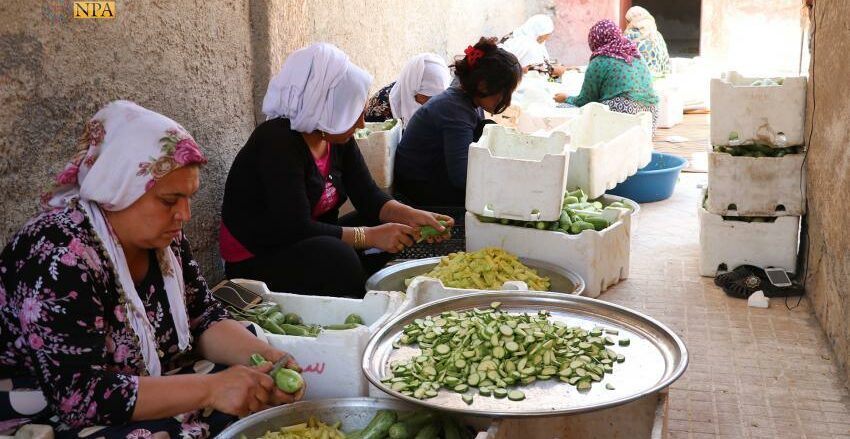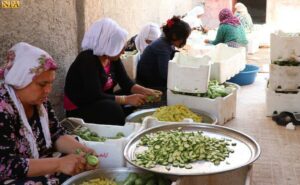House of Supplies or “Vina Jin” is considered one of the most important economic projects that help women – working in the project in particular, and women employed in the city of Kobani, in northern Syria in general – to enable them economically.
The project provides job opportunities for a number of women who do not have university degrees, or those who cannot read or write. It also helps women employees who work in the institutions and organizations to secure house supplies at the appropriate quality and price.
Jamila Fares, a 38 year old woman who is a supervisor of the project, told North-Press that preparing house supplies started at the beginning of this month and lasts for six months. House supplies are prepared, such as dried vegetables, jams, tomato puree, pepper paste, grape leaves and mahashi (eggplants and zucchini filled with rice and meat), depending on the availability of these products in the market or according to its harvest season.
The objective
The House of supplies or “Vina Jin” project, was started by the Women’s Committee in the Autonomous Administration in Kobani three years ago, then was completed by the Women’s Committee of Kobani last year. The project works with a capital of SYP 3 million.
Jamila Fares added that the goal of this project is to empower and support some women economically, pointing out that ten women directly benefit from the project for six months. Most of them are elderly and poor women who are “in need” of work, where they earn about 35,000 to 45,000 SYP per month, about 60 to 75 USD.
Fares explained that the Women’s Committee coordinates with one of the vegetable dealers in the city’s bazaar to obtain the best types of vegetables on a daily basis.
Mechanism of the work
Women work seven hours per day at the factory, which is in the south of the city, from 8 a.m. to 3 p.m., with a break.
“We are working on this project as we are now making mahashi. During tomato season, we make tomato puree, grape leaves, jams, makdous (eggplant filled with walnut and pepper paste dunked with olive oil), spices, pepper paste, wild mallow, and all dried vegetables, and we earn a good salary for six months as we help our families,” said Fatima Ahmad Sheikh, who is 50 years old and one of the beneficiaries from the project.
Fatima added that their work is not so tiring. Since they cannot read or write, the work is appropriate for them. There is also a kind of comfort in working in the factory, where women work as one family and share work equally.
From the producer to the customer
Products of House of Supplies are sold directly to customers in a special shop located at Al-Tilal Street in the center of the city at the cost prices, so the women workers get benefits, as well as women employees who are unable to prepare house supplies due to their jobs and employment. So both working women and employees can benefit at one time. In turn, Halima Darwish, who is 55 years old, sells the products to the customers after being employed at the shop in Al-Tilal Street by the Women’s Committee. “In the factory they prepare the supplies to be brought to the shop. I put them in bags and sell them to people according to the quantities they ask for,” says Halima.
Darwish confirms that locals, especially women, purchase most of their needs from their shop due to the good quality of the products that are prepared by hand, which are better than products made in factories and other laboratories. In addition, most of the women of the city work, while they don’t have enough time to prepare supplies for their houses, and the prices are also suitable, while the shop opens from 8 a.m. till 3 p.m.
Everyone benefits
Laila Roumi, a 31-year-old woman who relies on “Vina Jin” to secure her needs, explains that as all the employed women in Kobani, she does not have time to prepare house supplies, so she depends on this shop that helps many women with this task, noting that almost all types of house supplies are available in the shop.
Roumi added that the quality of products in the shop is very good because it’s made by the hands of women, not in factories. Its quality is distinguished due to the care of the products by working women and the supervision of its cleanliness, and prices are acceptable when compared to workers’ wages. Roumi also calls for the preparation of cheese and makdous in the factory, which are currently not available. Such types of house supplies are very important for every house, let alone the effort and time women need to prepare them, especially employees.
It’s noteworthy that the proportion of working women in Kobani, like other northern cities of Syria, is high, especially in recent years due to the migration of young men abroad.


